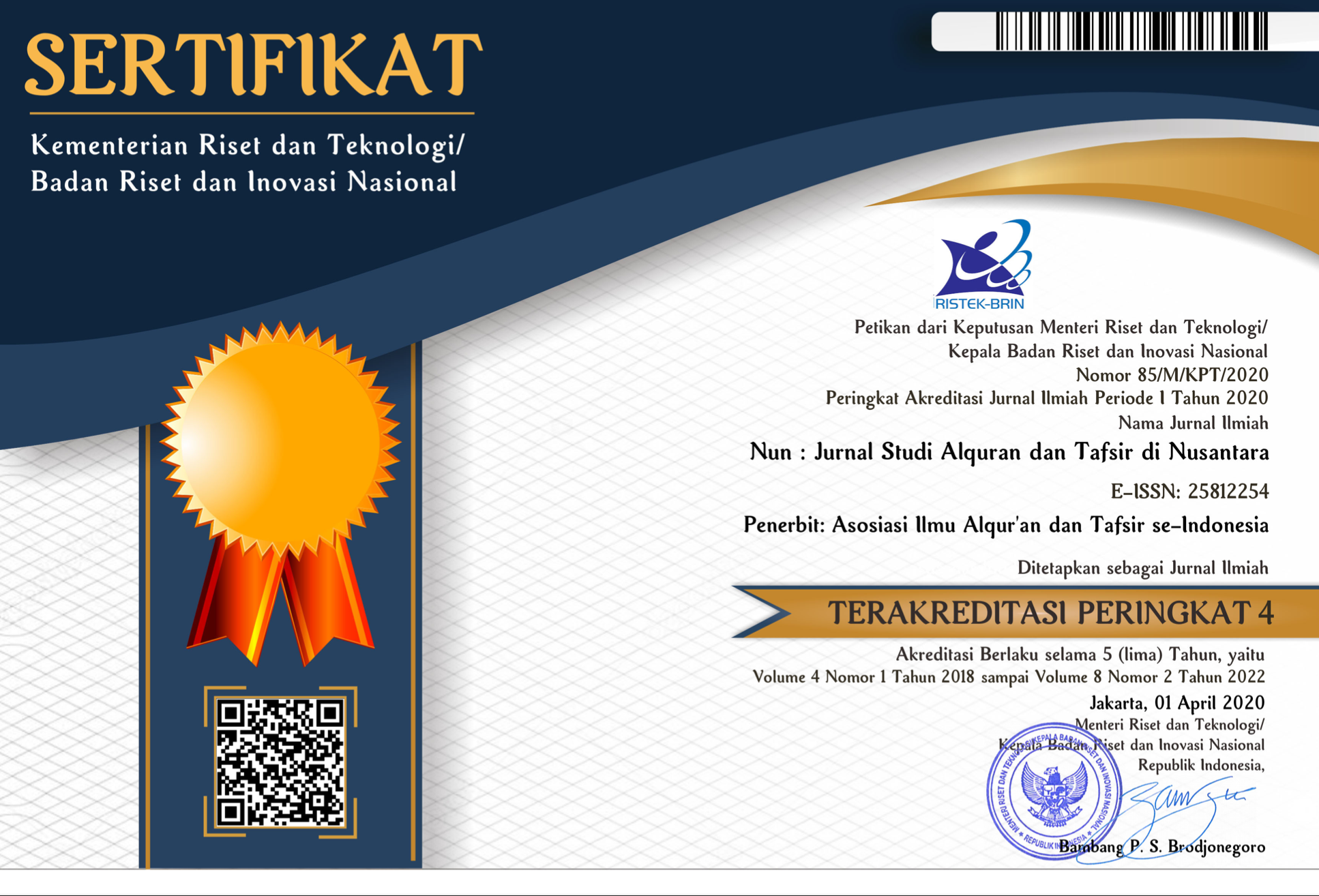Kisah Al-Qur'an dalam Tafsir Modern
Peninjauan Narasi Kisah Nabi Sulaiman dan Harut dan Marut dalam Q. 2:102 Menurut Tafsir al-Azhar Karya Hamka
DOI:
https://doi.org/10.32495/nun.v9i1.413Keywords:
Ayat-ayat kisah, Hamka, Tafsir Al-Azhar, Tafsir ModernAbstract
This article provides a detailed analysis of the presentation of Qur'anic stories in contemporary tafsir, with a specific focus on examining the nature and characteristics of modern tafsir. The current approach employed to differentiate classical and modern tafsir has primarily relied on periodization, making it inadequate in addressing the fundamental inquiry regarding the distinguishing characteristics of tafsir's various realities, encompassing both classical and modern iterations. The scholarly discourse surrounding contemporary tafsir subsequently transitions from examining the chronological classification of tafsir to exploring the distinct and varied nature of Qur'anic interpretation as an observable phenomenon. This article aims to provide a focused analysis of Tafsir Al-Azhar, a prominent contemporary exegesis authored by the Indonesian scholar Hamka. The primary objective of this study is to examine Hamka's exegesis of the narrative verses found in the Qur'an. The purpose of selecting this theme is to identify the unique characteristics of modern tafsir, which distinguish it from classical tafsir. This study aims to examine the process of producing modern tafsir, with a particular focus on the interpretation of Qur'anic verses that pertain to the narrative of Prophet Sulaymān, as well as Hārūt and Mārūt mentioned in Q. 2: 102. The contention put forth in this article posits that the categorization of commentaries as classical or modern cannot be definitively determined by the inclusion or exclusion of isrā'īliyāt, as it will invariably be intertwined with the interpretation of Quranic verses pertaining to narratives. However, contemporary scholars of exegesis have revisited a longstanding subject that has historically posed challenges within the Islamic community. This pertains to the question surrounding the validity and significance of isrā'īliyāt literature employed in the interpretation of religious texts. In this particular scenario, there is a tendency among scholars to dismiss isrā'īliyāt narrations that remain subject to debate among both classical and contemporary mufassirs, as well as narratives that lack rational basis.
References
Albayrak, Ismail, ‘Re-Evaluating The Notion of Isra’illiyat’, D.E.U. Ilahiyat Fakultesi Dergisi Sayi XIII-XIV, 2001, 69–88
Al-Qurṭubī, Tafsīr Al-Qurṭubī (Beirut: Al-Resalah Publisher)
al-Ṭabarī, Tafsīr Al-Ṭabarī, Terj Abdul Somad, Yusuf Hamdani (Jakarta: Pustaka Azzam, 2008)
Amir, Ahmad N, Abdi Omar Shuriye, and Jamal Ibrahim Daoud, ‘Muhammad Abduh’s Influence in Southeast Asia’, Middle East Journal of Scientific Research (MEJSR), 13 (2013), 124–38 <https://doi.org/10.5829/idosi.mejsr.2013.13.mae.10004>
Azra, Azyumardi, ‘The Transmission of Al-Manar’s Reformism to the Malay-Indonesian World: The Cases of al-Imam and al-Munir’, Studia Islamika, 6.3 (1999) <https://doi.org/10.15408/sdi.v6i3.723>
Bauer, Karen, ‘Room for Interpretation: Quranic Exegesis and Gender’ (unpublished Disertasi, Princenton University, 2008)
Feener, R. Michael, ‘Notes Towards the History of Qur’anic Exegesis in Southeast Asia’, Studia Islamika, 5.3 (1998) <https://doi.org/10.15408/sdi.v5i3.739>
Gusmian, Islah, ‘Tafsir Al-Qur’an Di Indonesia: Sejarah Dan Dinamika’, Nun: Jurnal Studi Alquran Dan Tafsir Di Nusantara, 1.1 (2015) <https://doi.org/10.32495/nun.v1i1.8>
Hamka, Tafsir Al-Azhar Jilid 1 (Singapura: Pustaka Nasional PTE LTD, 1989)
Ibn Kathīr, Tafsīr Ibn Kathīr (Riyadh: Dar al-Ṭayyibah, 1997)
Johns, A. H., ‘Qur’anic Exegesis in the Malay World’, in Approaches to the History of the Interpretation of the Qur’an, ed. by Andrew Rippin (Oxford: Clarendon Press, 1988)
M. Federspiel, Howard, ‘An Introduction To Qur’anic Commentaries In Contemporary Southeast Asia,”’, The Muslim World, LXXXI.2 (1991), 149–61
———, Indonesian Muslim Intellectuals of the Twentieth Century, Indonesian Muslim Intellectuals of the Twentieth Century, 08 (Singapore: ISEAS Publishing, 2006)
Mustaqim, Abdul, Epistemologi Tafsir Kontemporer (Yogyakarta: LKis, 2010)
Nettler, Ronald L., ‘A Post-Colonial Encounter of Traditions: Muhammad Sa‘īd Al-‘Ashmāwī on Islam and Judaism’, in Medieval and Modern Perspectives on Muslim-Jewish Relations (Routledge, 1995)
Nurtawab, Ervan, ‘Tafsīr Al-Jalālayn at the Crossroads: Interpreting the Qur’ān in Modern Indonesia’, Australian Journal of Islamic Studies, 6.4 (2021), 4–24 <https://doi.org/10.55831/ajis.v6i4.429>
———, ‘Tafsīr Al-Jalālayn at the Crossroads: Interpreting the Qur’ān in Modern Indonesia’, Australian Journal of Islamic Studies, 6.4 (2021), 4–24
Pink, Johanna, ‘Tradition and Ideology in Contemporary Sunnite Qur’ānic Exegesis: Qur’ānic Commentaries from the Arab World, Turkey and Indonesia and Their Interpretation of Q 5:51’, Welt Des Islams, 50.1 (2010), 3–59 <https://doi.org/10.1163/157006010X489801>
———, ‘Tradition, Authority and Innovation in Contemporary Sunnī Tafsīr: Towards a Typology of Qur’an Commentaries from the Arab World, Indonesia and Turkey’, Journal of Qur’anic Studies, 12.1–2 (2010), 56–82 <https://doi.org/10.3366/E1465359110000963>
Pitaloka, Sikha Amalia Sandia, ‘Bibel Sebagai Sumber Tafsir: Telaah Tafsir The Message of The Quran’ (unpublished masters, UIN Sunan Kalijaga, 2023) <https://digilib.uin-suka.ac.id/id/eprint/58304/> [accessed 24 November 2023]
Saleh, Walid A., ‘Preliminary Remarks on the Historiography of Tafsīr in Arabic : A History of the Book’, Journal of Qur’anic Studies, 12 (2010), 6–40 <https://doi.org/10.3366/E146535911000094X>
Sirry, Mun’im, ‘What’s Modern about Modern Tafsir?: A Closer Look at Hamka’s Tafsir al-Azhar’, in The Qur’an in the Malay Indonesian World, ed. by Majid Daneshgar, Peter G. Riddell, and Andrew Rippin (London and New York: Routledge, 2016), pp. 198–211
Usman, A. H., M. Ibrahim, and M. N. A. Kadir, ‘The Ijtima’i Methodological Approach: A Review on Economic Verses in Tafsir Al-Azhar By Hamka (1908-1981)’, Turkish Online Journal of Design Art and Communication, 8.SEPT (2018), 809–17 <https://doi.org/10.7456/1080sse/115>
Van Bruinessen, Martin, ‘Kitab Kuning: Books In Arabic Script Used In The Pesantren Milieu: Comments On A New Collection In The Kitlv Library’, Bijdragen Tot de Taal-, Land- En Volkenkunde, 146.2/3 (1990), 226–69
Wardani, Trend Perkembangan Pemikiran Kontemporer: Metodologi Tafsir Al-Qur’an Di Indonesia (Banjarmasin: Antasari Press, 2017)
Wielandt, Rotraud, ‘Exegesis of the Qur’an: Early Modern and Contemporary’, in Encyclopaedia of the Qur’an (Leiden: Brill, 2002), pp. 124–42
Downloads
Published
How to Cite
Issue
Section
License

This work is licensed under a Creative Commons Attribution-NonCommercial 4.0 International License.








